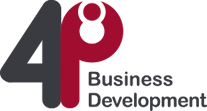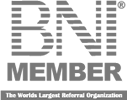How can you do things differently?
As a business owner and leader, one of the most important skills you need is that of reflection. Not only self-reflection, but reflection on what’s happening within your organisation and how you could do things differently …

Reflection is all about careful and considerate thought!
copyright: 4p business development
The practice of reflection is about reflecting on what you do or what has happened. It is closely linked to the concept of learning from experience, in that you think about what you did, and what the results were, and decide from that what you would do differently next time.
“Reflection is all about careful and considerate thought!”
But the kind of reflection that is really valuable to leaders is more than that; the most useful reflection involves the conscious consideration and analysis of beliefs and actions for the purpose of learning.
Reflection allows your brain an opportunity to pause amidst the chaos, untangle and sort through observations and experiences, consider multiple possible interpretations, and create meaning.
This meaning becomes learning, which can then assist you in making informed decisions about future mindsets and actions.
For business owners and leaders, this is an extremely important to your ongoing growth and development and success of your business. As Peter Drucker said, “Follow effective action with quiet reflection. From the quiet reflection, will come even more effective action.”
A recent article in The Harvard Business Review suggested that if you have found yourself making these same excuses, you can become more reflective by practising a few simple steps:
-
Identify some important questions. But don’t answer them yet. Here are some possibilities:
-
What are you avoiding?
-
How are you helping your colleagues achieve their goals?
-
How are you not helping or even hindering their progress?
-
How might you be contributing to your least enjoyable relationship at work?
-
How could you have been more effective in a recent meeting?
-
-
Select a reflection process that matches your preferences. Many people reflect through writing in a journal. If that sounds terrible but talking with a colleague sounds better, consider that. As long as you’re reflecting and not just chatting about the latest sporting event or complaining about a colleague, your approach is up to you. You can sit, walk, bike, or stand, alone or with a partner, writing, talking, or thinking.
-
Schedule time. Most leaders are driven by their calendars. So, schedule your reflection time and then commit to keep it. And if you find yourself trying to skip it or avoid it, reflect on that!
-
Start small. If an hour of reflection seems like too much, try 10 minutes. Many leaders found that the most significant driver of positive emotions and motivation at work was making progress on the tasks at hand. Set yourself up to make progress, even if it feels small.
-
Do it. Go back to your list of questions and explore them. Be still. Think. Consider multiple perspectives. Look at the opposite of what you initially believe. Brainstorm. You don’t have to like or agree with all of your thoughts – just think and to examine your thinking.
-
Ask for help. For most leaders, a lack of desire, time, experience, or skill can get in the way of reflection. Consider working with a colleague, therapist, or coach to help you make the time, listen carefully, be a thought partner, and hold you accountable.
What can be done to help develop the critical, constructive and creative thinking that is necessary for reflective practice? Neil Thompson suggests in his book “People Skills” that there are six steps:
-
Read – around the topics you are learning about or want to learn about and develop
-
Ask – others about the way they do things and why
-
Watch – what is going on around you
-
Feel – pay attention to your emotions, what prompts them, and how you deal with negative ones
-
Talk – share your views and experiences with others in your organisation
-
Think – learn to value time spent thinking about your work
In other words, it’s not just the thinking that’s important. You also have to develop an understanding of the theory and others’ practice too, and explore ideas with others.
“Would you like to know more?”
To find out more about reflection and to learn how to reflect on critical incidents and events on a regular basis, so that it becomes integral to your thinking call me on 01280 700405 or click here to ping me an email and let’s see how I can help you.
Until next time …

KATH BONNER-DUNHAM
|
PS: |
If you’re looking for a partner to help grow your business, visit www.4pbusinessdevelopment.co.uk to discover how 4P Business Development can help you! |










